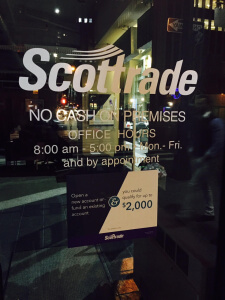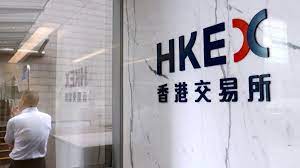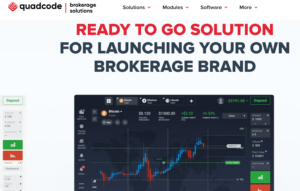Online trading in America a dead man walking? Not by a LONG way as depicted by firm with 500 local branches
As Britain’s retail online trading companies are only beginning to venture into the provision of mult-asset platforms which provide more than a choice of CFDs on major currencies, America, a country which many industry executives consider not viable for establishing retail brokerage businesses, is way ahead. Far from the perceived situation that America’s brokerages have […]

As Britain’s retail online trading companies are only beginning to venture into the provision of mult-asset platforms which provide more than a choice of CFDs on major currencies, America, a country which many industry executives consider not viable for establishing retail brokerage businesses, is way ahead.
Far from the perceived situation that America’s brokerages have dwindled following the exit from the US market of FXSolutions which sold its client base to GAIN Capital in 2013, GFT, IG Group and Alpari, along with the offloading of IBFX’s US and Australian MT4 client base to FXCM more recently, the domestic firms dominate, but some that are never reported about, operate in a very different fashion.
FX brokerages with offices in financial centers such as London or Geneva, are often publicly traded entities which focus their efforts on refining their trading technology, producing sophisticated branding, and aiming for a user experience that combines best execution with ever-evolving charts, ensuring that traders think of their provider as a combination of leading edge, ultra-modern technology and top-drawer financial provenance.
A good example of well-known online trading companies going in this direction by expanding asset classes is today’s addition by Invast Financial Services in Australia of 19 equity index futures, available as CFDs via a direct market access execution model.
Volume and local presence is not only profitable, but business-critical
Part of the cause of the perception that electronic trading in the US is a ‘dead man walking’ is a deep-rooted belief within the industry that the National Futures Association (in my opinion the only true non-bank financial markets regulator in the world) wants FX firms to either pack up shop or go on exchange, and perhaps more importantly, that the firms doing the big retail business do not sponsor global conferences, participate in industry media, nor are the focus of news such as monthly volumes or matters relating to the evolution of their business.
Here in Manhattan, five years ago, Scottrade opened its 500th office.
Think about this. The opening of just one new office in Hong Kong, or Cyprus by a known British, Australian or Swiss FX company generally makes the industry news, and then becomes a subject of discussion in boardrooms across the entire industry, even if this is a second or third office for a large company.
Scottrade has 500 offices across just one country. The company is a discount brokerage, whose raison d’etre is far removed from the attempts at sophistication by many electronic brokerages which operate in the retail market outside the United States. Indeed, it is purely a discount brokerage which provides ETFs, FX options, and common stock apart from pink slips.
Customers can walk in from the street and open accounts, or do so online but the important consideration here is that Scottrade’s branches provide investment education, as well as brokerage services, therefore acting as a good retention tool.
Clearly physical presence and ‘offline’ facilities are still important in this online world.
Not worth having physical ‘offline’ premises with staff? Think again…
Having physical offices is expensive in terms of real estate, human resources and offers limited footfall.. This may be a misconception. Consider that online brokerages have to pay in some cases $1,000 to acquire a new client via an online model. Despite the office space costs, salaries, bonuses and insurances, it would not be surprising at all if the acquisition costs experienced by Scottrade via their local office model are less. In 2012, the company employed 3,700 staff and had revenues of $776 million.
Bearing in mind that only a few of these premises are in cities with very high real estate costs (such as the office pictured in Manhattan), the reach on a localized basis is sensible. In the Mid-West, for example, or Scottrade’s native Arizona, land is cheap, therefore resources can be provided to ensure that employees are well remunerated and content in their positions, which in turn enhances the customer experience and aids retention.
The company is not publicly reporting, therefore the actual profits are unknown but it can be considered that just three years after a devastating financial crisis that swept global financial institutions, the company remained strong and not only retained all of its offices, but expanded further.
As far as operating costs are concerned, Scottrade did not make any redundancies whatsoever during the financial crisis in 2008 – a year which signaled the end for many financial institutions such as Lehman Brothers, and the following months of turmoil saw the world wave goodbye to MF Global and PFG Best, along with customer funds.
Indeed, quite the opposite is the case for discount firms. Scottrade actually hired a further 1,000 new associates and opened 75 new branches in 2008, which was not the focus of news, which instead turned its attention to the dire straits other companies were in.
Companies in other regions such as Saxo Bank and Swissquote have opened lounges, which are luxuriously appointed retail units on main streets in European cities that offer traders a showroom-like experience, where they can view the trading platforms, gain a good overview of the brand and even open accounts. This approach is aimed at the high net worth potential customer, and has been heralded as innovative, however Scottrade is present in 500 locations and aims at the ordinary investor, and has been operating these for several years.
Discount brokerages in other regions have been less able to compete with their non-discount peers. This was evident in the case of InterTrader Direct, whose owner, bwin.party Digital Entertainment Plc (LON:BPTY) recently entered into discussions with gaming firm 888 Holdings Public Limited Company (LON:888) and GVC Holdings PLC (LON:GVC) concerning a potential acquisition of InterTrader Direct for approximately $1.7 billion (discussions are still in progress).
In addition to its web-based platform, Scottrade provides a proprietary platform for several devices, ScottradeELITE Advanced Trading Platform, Scottrader Streaming Quotes, and Scottrade Mobile Website as well as mobile applications for iPhone, Android and Blackberry devices. The company used to provide a further platform called OptionsFirst, but this was discontinued in April this year.
Regulatory censuring has not been completely unintrusive for Scottrade. In 2008, the Securities and Exchange Commission charged the company with making fraudulent misrepresentations to clients. The company settled the dispute by paying a $950,000 fine.
In conclusion, a matter of great importance to consider is that if the theory held by many in the industry is that whilst it may well be the case that OTC FX is not the NFA’s most favored business category, multi-asset, non-spot FX discount brokerages offering several assets to retail customers on a low-cost basis via their website and branches, are very much going from strength to strength in the Land of the Free.
Photographs: Scottrade’s 500th branch office in Midtown Manhattan, New York, yesterday evening. Photograph copyright Andrew Saks-McLeod









